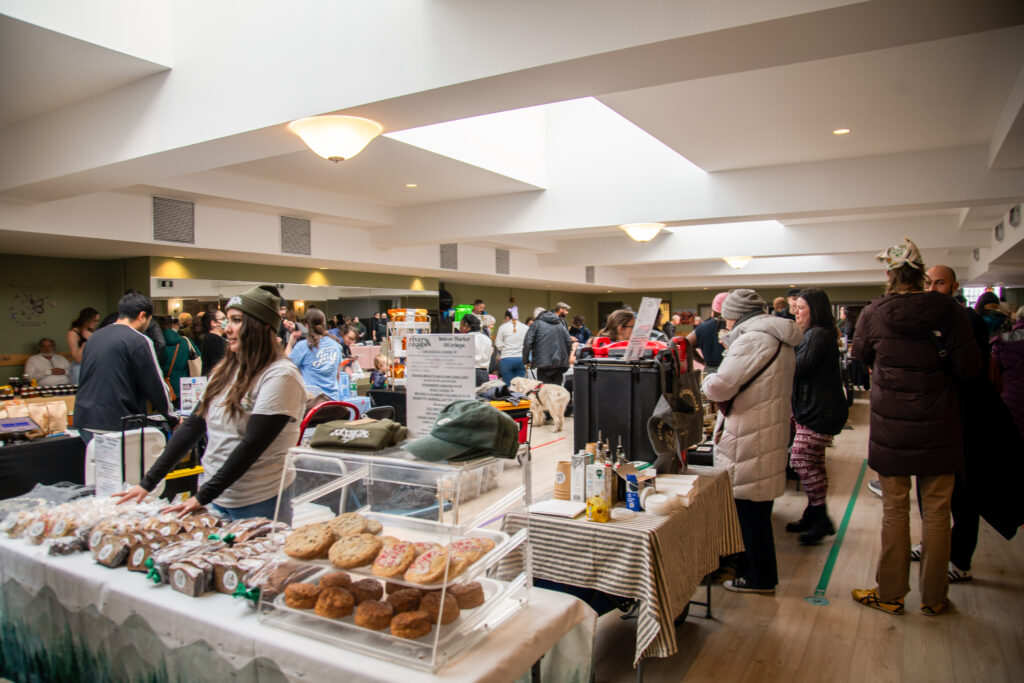Edgewater’s first Indoor Market unites local businesses to celebrate eco-friendly, farmed goods.
Market Your Calendars: Edgewater’s Indoor Market Brings Eco-friendly Shopping
On an icy cold morning in Edgewater, customers bundled up in scarves and coats to line up outside the second floor of the community center and park at the Broadway Armory.
The Edgewater Indoor Market debuted Jan. 18, introducing the community’s first indoor marketplace. Featuring more than 30 vendors, the event provided a platform for small businesses to showcase sustainable and locally made products.
Sponsored in part by the university, the market connected Edgewater, Rogers Park and Loyola students to environmentally conscious businesses and practices.
During the market, Loyola’s Urban Agriculture program sold produce grown in the School of Environmental Sustainability’s Ecodome Greenhouse.
Alejandra Rodriguez, a fourth-year majoring in environmental policy, said they sell 50% of the produce grown in the greenhouse and donate the other 50%. The program uses sustainable and organic practices in their farming and encourages students to join the initiative.

“Being in a market is a really great way to directly interact with our community and not separate ourselves from it,” Rodriguez said. “We’re interacting with the people we’re selling to, and I think it’s a really good way of allowing Loyola’s mission of integrating itself into this community to really thrive.”
Garret Karp, the executive director of the Edgewater Chamber of Commerce, said Loyola is one of the top sponsors for all Edgewater events, and he encouraged students to join the Chamber.
“We love to see Loyal students coming to our events and getting more involved in the community,” Karp said. “For the graduate Loyola students, Edgewater Chamber networking events are a really great place to get started learning about the local business community and meeting people and networking.”
Vendors at the market displayed a shared commitment to sustainability and community engagement.
John Bailey Honey, a beeswax and honey company, said they aim to reduce their environmental impacts with eco-friendly business methods.
Alicia Sporinsky, the manager at John Bailey Honey, said their sustainable practices are what make them a crowd buzzer.
“We have about 36 hives across the county,” Sporinsky said. “All our products — from organic honey to beeswax — are sourced directly from our hives, and we use sustainable pine boxes and recyclable glass jars to minimize waste.”
Denise Hows of Overflow Candle Co said she started the business during the COVID-19 pandemic. Hows said the majority of household candles pose a threat to the body because they contain toxic chemicals. Chemicals are emitted when burning candles with polycyclic aromatic hydrocarbons — the same organic compound released with engine exhaust, according to The National Library of Medicine.
Hows said her business stresses ingredient transparency in candle making.
“I use coconut soy wax instead of paraffin,” Howes said. “It’s more sustainable and less toxic. Education is key — I want people to understand what’s in their candles and household products.”
Understanding what goes into products is one of the ways students can make informed decisions and establish a deeper commitment to sustainable living. Sophie Desaesilva of WasteNot Compost said there are simple steps to reduce waste.
“Reducing is the biggest step,” Desaesilva said. “Shop at stores that don’t use plastic, buy only what you need and compost. Talking about composting — sharing it with neighbors and friends — can make a big difference.”
Deirdre Austin, owner of plant-based apothecary DMApothecary, said she started her business after countless visits to the emergency room and finding out the products she bought from stores were toxic.
“We make everything in-house by hand,” Austin said. “From plant-based medicines to bath bombs, we strive for zero waste and encourage clean, green living. Every little step counts — even saving the planet one reusable cup at a time.”
Austin said she’s on a mission to get her customers to convert to clean and green approaches.
“I’m trying to educate people not to just to save the planet, but to become healthy,” Austin said. “A lot of my products are very good for building your immune system and making sure that you’re prepared to deal with all of the viruses that are out.”

Venturing from Harvard, IL, Wanda Farm hopes to immerse itself in the Chicago scene, and encourages people to look for produce that doesn’t harm the environment.
Wanda Farm uses regenerative farming, which protects natural resources and restores rather than depleting the environment.
Tara Sullivan, the manager of Wanda Farm, said it’s important for farmers not to till the land. By not using chemicals on land, grazing animals can be healthy without growth hormones or antibiotics.
Sullivan said it’s hard for customers to find produce that’s sustainable, and Wanda Farm is working on accessible approaches.
“We do home delivery and we try to get to as many farmers markets as we can,” Sullivan said. “It’s difficult to find locally produced products, but we try our best with the home deliveries to ensure customers get the best quality food.”
Growing microgreens in an urban environment reduces the negative environmental impact with long-distance food transportation, according to Green Living Journal. Katie Staudt, owner of Meraki Urban Farms, built her business based on her passion for microgreens.
Staudt said education in sustainability is efficient in getting people to recognize the little ways they can help the environment. She conducts workshops at universities, helping people learn about growing microgreens in an urban environment.
“Locally grown food is a year-round source of nutrition that’s accessible and sustainable,” Staudt said.
With zero-waste candles, homegrown products and composting tips shared alongside jars of organic honey and handmade apothecary products, the Edgewater Indoor Market promoted small, eco-friendly businesses to the neighborhood.
The market is set to return two more times this winter with more vendors and an increased focus on sustainability Feb. 15 and March 22.
-

Noman is a first-year neuroscience and English double major. When not reviewing books or writing about music, Noman enjoys reading, writing poetry, drinking coffee, and watching Young Sheldon. She loves exploring new narratives and capturing the heart of campus stories with a focus on culture and the arts.
View all posts
Topics
Get the Loyola Phoenix newsletter straight to your inbox!


